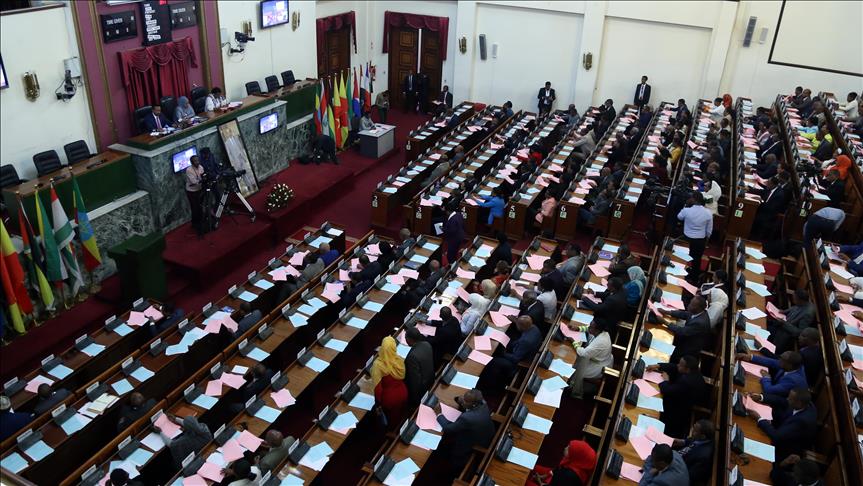

NAIROBI (Reuters) – Ethiopia’s parliament has approved an electoral and political parties draft bill, the state broadcaster reported on Saturday, paving the way for national elections next year, the first to be held under reformist Prime Minister Abiy Ahmed.
On August 9 Ethiopia’s ruling coalition said it will hold a national election in 2020, defying worries over security and displaced people within the country that had led some to speculate the election might be postponed.
“The parliament unanimously approved the revised bill,” the Ethiopian Broadcast Corporation (EBC) reported.
National parties will require at least 10,000 founding members, while regional parties need 4,000, EBC said.
Abiy has rolled out a series of political reforms since coming to power last year, including unbanning many political parties, releasing political prisoners and journalists, and welcoming home exiled rebel groups.
But an attempted coup in June by a rogue militia in the northern Amhara region had raised doubts over the ruling party’s ability to ensure security, while an increase in ethnic violence across the country made some query whether the election would be held.
A national census has already been postponed twice, potentially undermining logistics for the polls including the drawing up of constituencies in Africa’s second-most populous nation.
Tensions within the ruling Ethiopian People’s Revolutionary Democratic Front (EPRDF), which has ruled with an iron grip since 1991, have risen following the failed coup.
In a rare public feud earlier this month, two of its four ethnic parties traded barbs over who was responsible for the violence.
After decades of harsh rule, Abiy’s reforms have created new freedoms but old grievances and disputes have resurfaced, while local power-brokers seeking to build support by securing power and territory for their ethnic groups have been emboldened.
In June parliamentarians in both houses voted overwhelmingly to delay the census again by a year, due to an upsurge in ethnic conflicts that has forced 2.4 million Ethiopians out of their homes, according to United Nations figures.
Opposition parties criticize election law changes
On Friday 57 opposition parties said their proposed amendments to the bill were ignored by the ruling party, who currently hold all parliamentary seats.
We had suggestions which were not included in the final bill, for example we are strongly opposed to the provision that civil servants must vacate their jobs if they are going to run for office,” Desalegn Chane, head of the opposition National Movement of Amhara (NAMA), told Reuters.
“This is unfair. Government employees should be allowed to run.”
Merera Gudina, a former political prisoner and the chairman of the Oromo Federalist Congress, said his party’s request to lower the number of signatures was ignored.
“We made a lot of noise against the final draft and were strongly against some of the provisions that were put in at the last minute. It was the invisible hands of the EPRDF,” he told Reuters.
Geressu Gessa, speaking on behalf of a group of opposition parties, told reporters on Friday: “The government should stop its approach of non-inclusiveness and…call a discussion with us.”
more recommended stories
 Somaliland’s Berbera Industrial Park: A New Era of Investment and Job Creation
Somaliland’s Berbera Industrial Park: A New Era of Investment and Job CreationThe Government of Somaliland, under the.
 President Irro’s Landmark Visit to UAE: A Diplomatic and Economic Win for Somaliland. Dubai, UAE – Somaliland’s Diplomatic Breakthrough
President Irro’s Landmark Visit to UAE: A Diplomatic and Economic Win for Somaliland. Dubai, UAE – Somaliland’s Diplomatic BreakthroughBy: Abdi Jama President Dr. Abdirahman.
 Kenya’s Unjustifiable Interference in Sudan: A Grave Violation of International Law and Regional Stability
Kenya’s Unjustifiable Interference in Sudan: A Grave Violation of International Law and Regional StabilityBy: Abdi Jama Kenya’s continued meddling.
 𝗙𝗼𝗿𝗺𝗲𝗿 𝗣𝗿𝗲𝘀𝗶𝗱𝗲𝗻𝘁 𝗠𝘂𝘀𝗲 𝗕𝗶𝗵𝗶’𝘀 𝗥𝗲𝗰𝗸𝗹𝗲𝘀𝘀 𝗔𝗰𝘁𝗶𝗼𝗻𝘀 𝗠𝘂𝘀𝘁 𝗡𝗼𝘁 𝗕𝗲 𝗜𝗴𝗻𝗼𝗿𝗲𝗱 – Abdihalim Musa
𝗙𝗼𝗿𝗺𝗲𝗿 𝗣𝗿𝗲𝘀𝗶𝗱𝗲𝗻𝘁 𝗠𝘂𝘀𝗲 𝗕𝗶𝗵𝗶’𝘀 𝗥𝗲𝗰𝗸𝗹𝗲𝘀𝘀 𝗔𝗰𝘁𝗶𝗼𝗻𝘀 𝗠𝘂𝘀𝘁 𝗡𝗼𝘁 𝗕𝗲 𝗜𝗴𝗻𝗼𝗿𝗲𝗱 – Abdihalim MusaYesterday, Somaliland witnessed a deeply troubling.

